An endorsement letter is a powerful tool in the realm of professional relationships, often carrying significant weight and influence. It serves as a formal declaration of support or approval for an individual, product, or organization. Typically written by someone in a position of authority, an endorsement letter can open doors, enhance credibility, and pave the way for new opportunities.
Table of Contents
Whether it’s an employer recommending an employee or a partner endorsing a product, the endorsement letter plays a key role in validating one’s strengths and potential.
What is an Endorsement Letter?
An endorsement letter is a written statement that expresses support or approval for a person, product, service, or organization. It highlights the qualities, achievements, or character of the subject and serves as a form of validation.
Someone with credibility and direct experience usually writes this letter to vouch for an individual or entity. People commonly use it in employment, academia, politics, and business to build trust and enhance reputations.
Types of Endorsement Letters
1. Employee Endorsement Letter
An employer uses an employee endorsement letter to recognize and promote the employee’s skills, dedication, and contributions. They can use this letter for various purposes, including job applications, performance evaluations, promotions, or career advancements.
This letter highlights the employee’s professional abilities, work ethic, and accomplishments, providing a compelling case for their continued success within the organization.
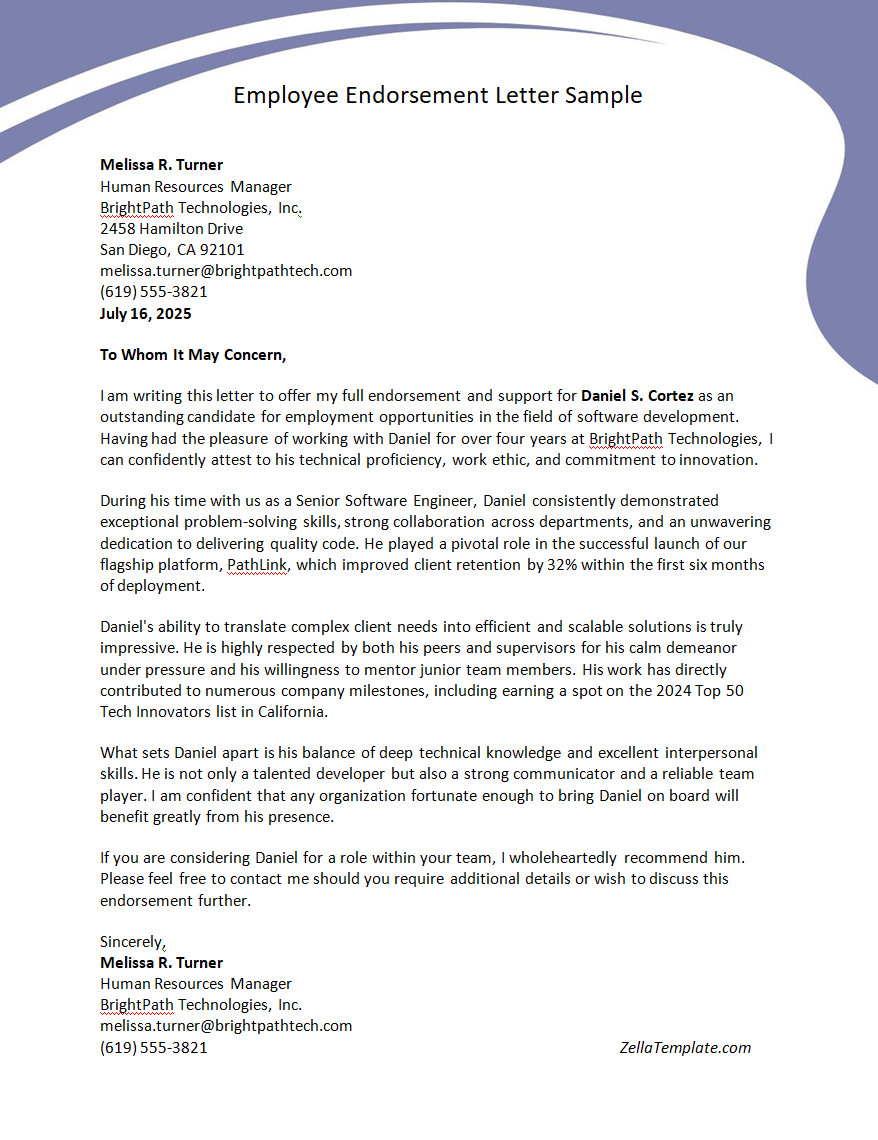
2. Product Endorsement Letter
A satisfied customer, business partner, or influencer writes a product endorsement letter to share their positive experience with a product or service. They highlight its features, quality, and effectiveness to help promote it to potential consumers.
Companies use these letters to influence purchasing decisions, build brand credibility, and create a positive image in the marketplace. Marketers often include them in campaigns, product launches, and brand promotions.
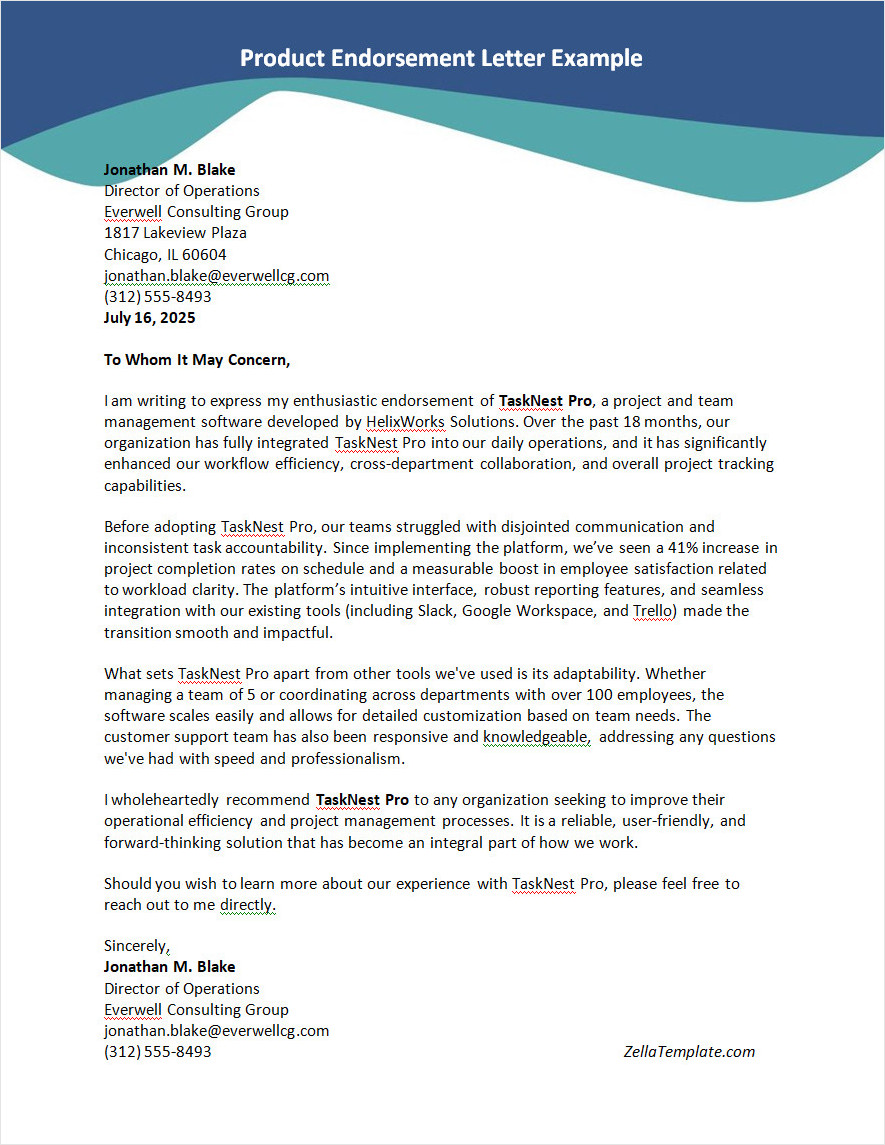
3. University Endorsement Letter
A university endorsement letter is a formal recommendation from an academic institution to endorse a student, faculty member, research project, or collaboration. This letter showcases the academic achievements, research capabilities, and potential impact of the endorsed individual or project.
These letters are essential for securing research grants, academic scholarships, collaborations with other institutions, or recognition for scholarly achievements. They serve as a validation of academic excellence and potential for success within the academic community.
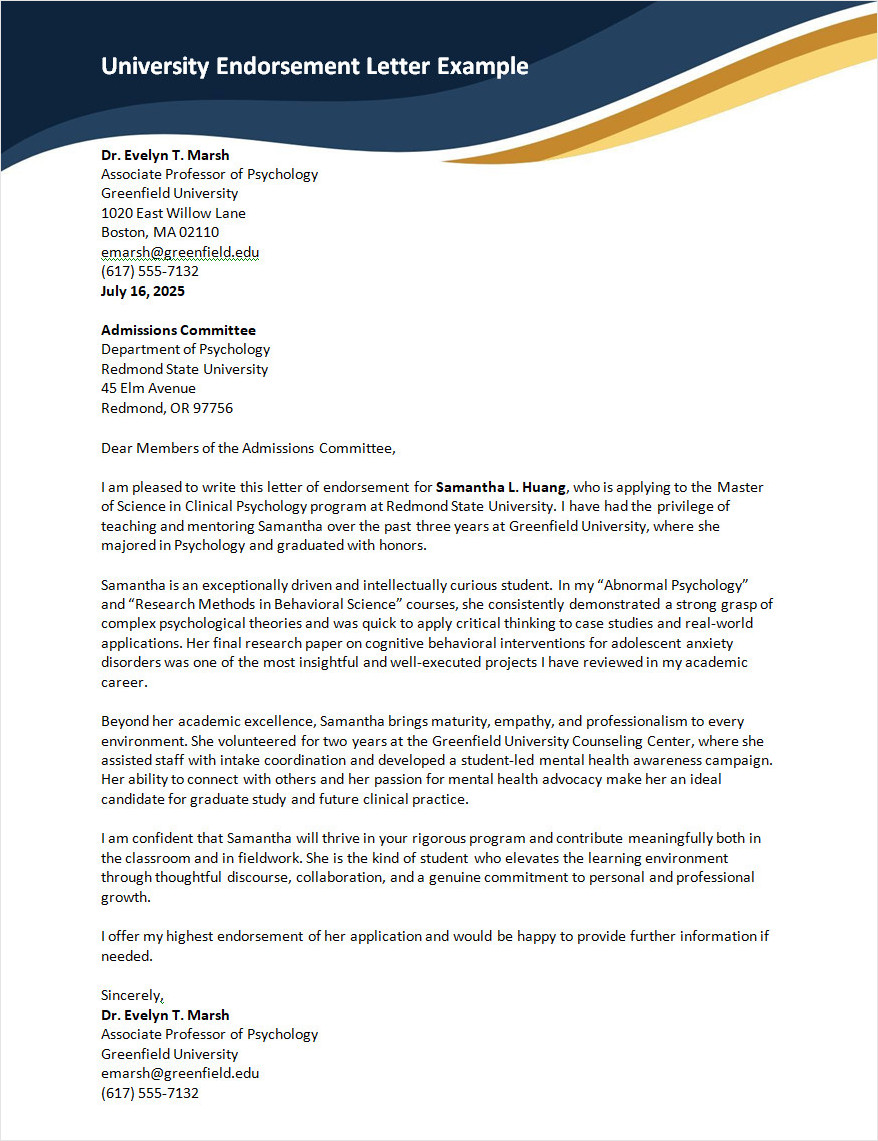
4. Student Endorsement Letter
A teacher, mentor, or advisor writes a student endorsement letter to attest to the student’s academic achievements, personal qualities, and potential.
People commonly use this type of letter for college applications, scholarship submissions, internship opportunities, or job placements. It highlights the student’s academic performance, extracurricular involvement, leadership skills, and character traits that set them apart from their peers. These letters play a crucial role in helping shape the student’s future academic and professional success.
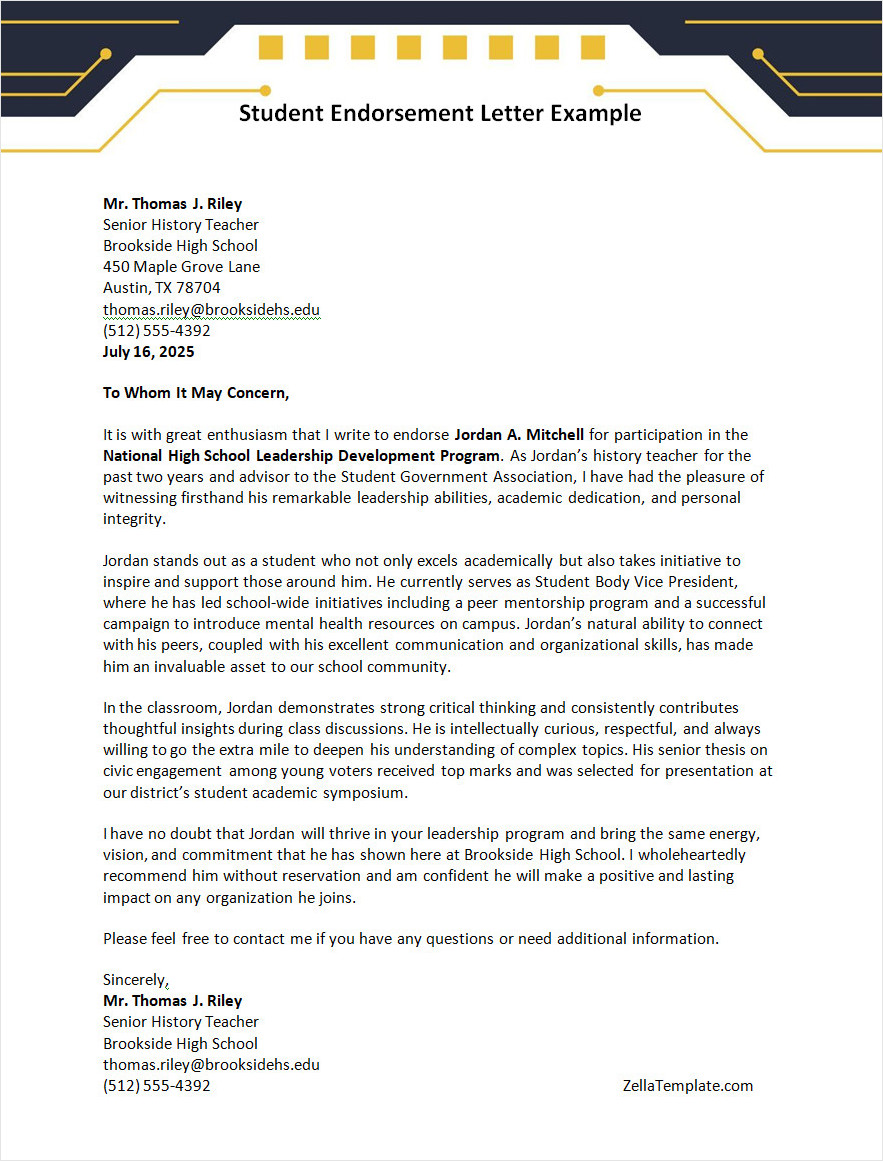
5. Internship Endorsement Letter
An internship endorsement letter is a formal recommendation from a supervisor, mentor, or employer who has overseen an intern’s performance, skills, and contributions during their internship.
This letter serves as a validation of the intern’s work ethic, professionalism, and growth during their internship experience. It can be used to support future job applications, academic credits, or professional development opportunities. These letters highlight the practical skills, industry knowledge, and potential for success that the intern has demonstrated during their internship.
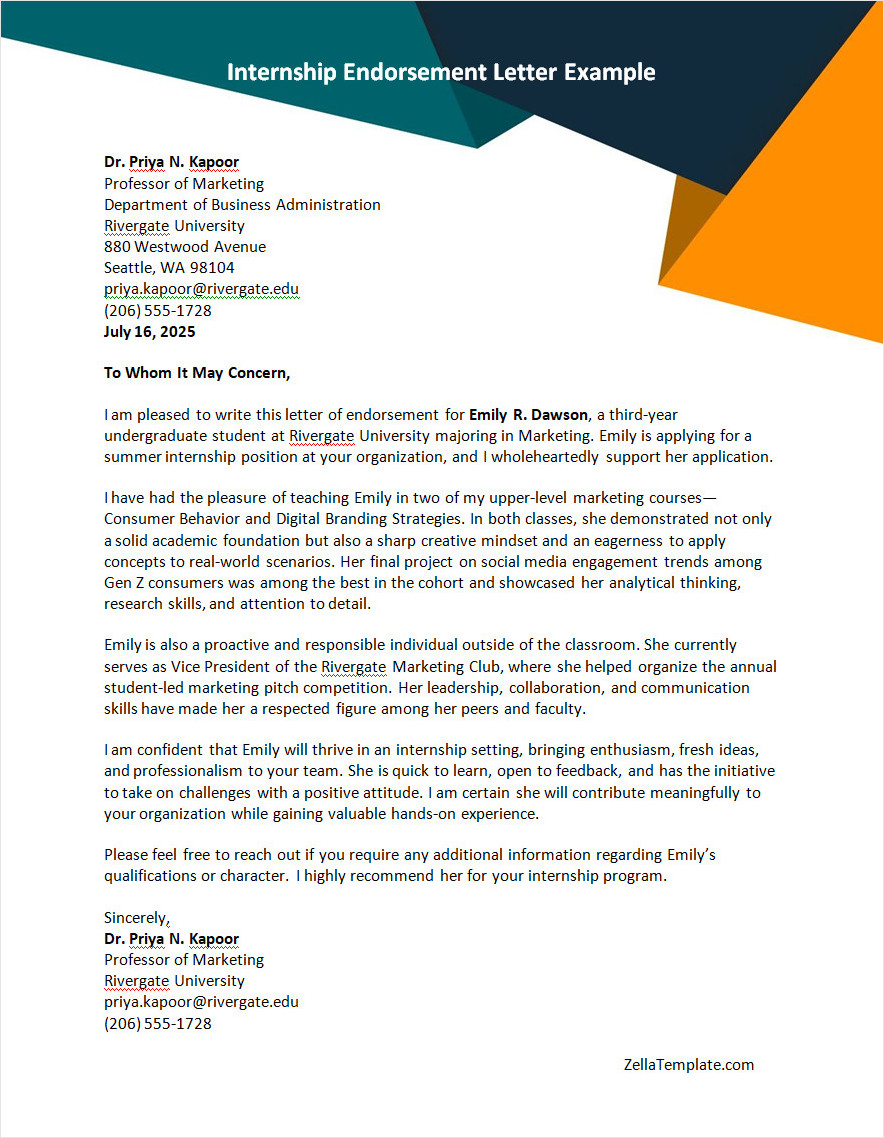
6. Scholarship Endorsement Letter
A scholarship endorsement letter is a recommendation from a scholarship committee, donor, or academic institution to endorse a deserving candidate for a financial award. This letter outlines the candidate’s academic achievements, financial need, community involvement, and potential for success in their field of study.
These letters are essential for securing financial support for education, research projects, or professional development opportunities. They serve as a validation of the candidate’s qualifications, aspirations, and commitment to academic excellence.
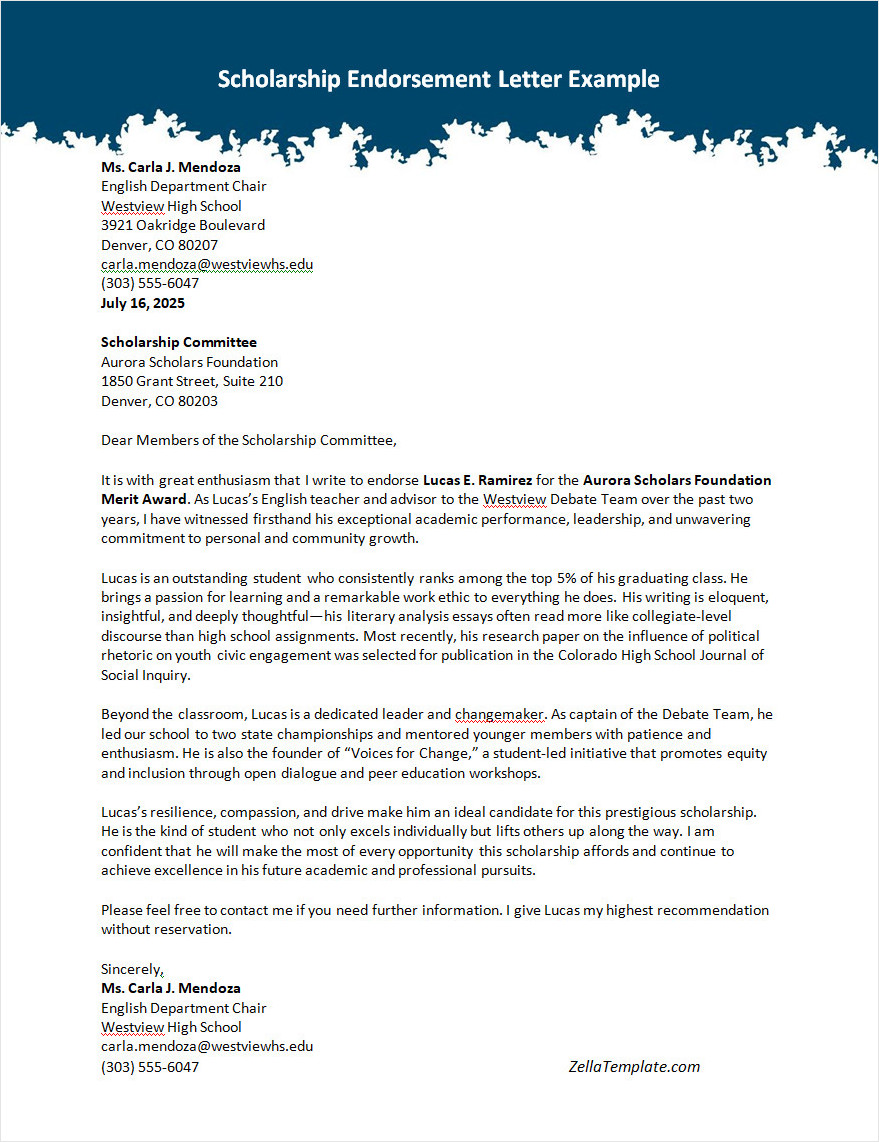
7. Personal Endorsement Letter
A personal endorsement letter is a heartfelt testimonial from a friend, family member, colleague, or acquaintance who can vouch for someone’s character, abilities, or achievements.
This type of letter is often used for personal recommendations, community endorsements, social endorsements, or personal endorsements. It highlights the unique qualities, strengths, and accomplishments of the individual, painting a compelling picture of their worth and impact on others. These letters are powerful tools for building relationships, fostering connections, and celebrating the successes of those we care about.
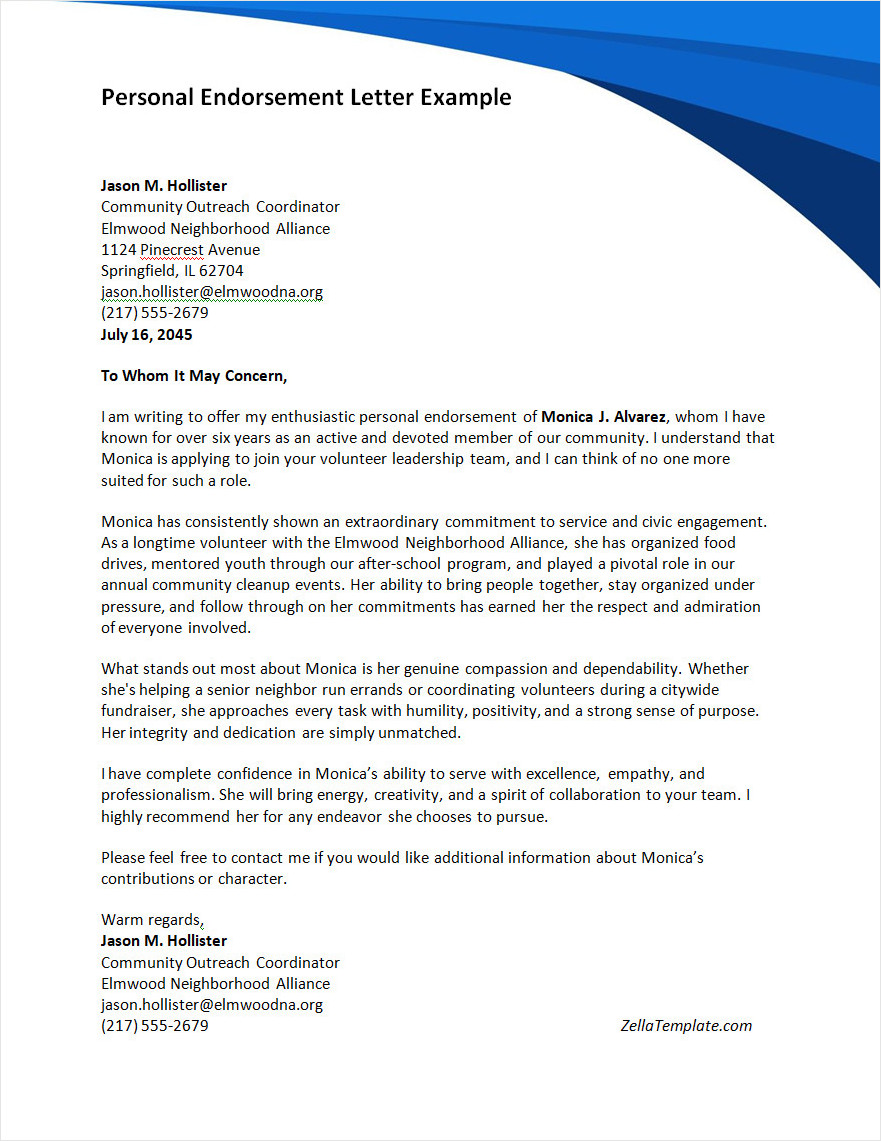
What Must Be Included in an Endorsement Letter?
The endorser should include specific details about the person, product, or organization they are endorsing. They should clearly explain the reasons for the endorsement and support their claims with examples or evidence.
The endorser must write the letter in a professional tone, using proper formatting, grammar, and punctuation. They should address the letter to the intended recipient and include their contact information for verification. To validate the letter’s authenticity, the endorser should also sign and date it.
1. Clear Introduction
Start the endorsement letter with a clear introduction that explains your relationship to the person or entity you’re endorsing. Use this opening to set the tone and provide context for the reader. Briefly state why you’re writing the endorsement and highlight the qualities or achievements that make the subject worthy of support. Keep the introduction concise, engaging, and focused on the letter’s purpose.
2. Detailed Description
The endorser should use the body of the letter to describe in detail the qualities, accomplishments, or characteristics of the person, product, or organization they are endorsing. They should include specific examples, anecdotes, or evidence to support their claims.
By being specific, detailed, and objective, the endorser can make a stronger case. Including real-life experiences helps make the endorsement more compelling and credible to the reader.
3. Specific Examples or Anecdotes
To make the endorsement letter more impactful and persuasive, the endorser should include specific examples or anecdotes that illustrate the qualities or achievements they are highlighting. These examples should showcase the unique strengths, skills, or characteristics of the individual or entity.
By choosing relevant, memorable, and authentic stories, the endorser can connect with the reader and add credibility and depth to the letter, making it more convincing and compelling.
4. Strong Endorsement Statement
The endorser should conclude the letter with a strong statement that conveys their confidence, support, and approval of the person or entity they are endorsing. They should express their belief in the subject’s qualities, abilities, or achievements in a positive, assertive, and enthusiastic tone.
This final endorsement reinforces the message and helps shape the reader’s perception, potentially influencing their decision-making process.
5. Contact Information for Verification
To ensure the authenticity and credibility of the endorsement letter, it is important to include contact information for verification purposes. This information should include the endorser’s name, title, organization, and contact details. It allows the recipient to follow up with the endorser if they have any questions or need further clarification.
Providing contact information adds transparency, accountability, and reliability to this letter, demonstrating the credibility and integrity of the endorsement.
How Do You Start an Endorsement Letter?
When writing an endorsement letter, it is essential to begin with a compelling opening that captures the reader’s attention. Begin by introducing yourself and your relationship to the person or entity being endorsed.
Clearly state the purpose of the letter and why you are endorsing them. Provide specific examples or anecdotes that illustrate the qualities or achievements you are endorsing
1. Introduction with Personal Connection
The endorser should open the letter by establishing a personal connection with the individual or entity they are endorsing. They can do this by briefly explaining how they know the person, describing their experience working together, or stating why they are qualified to give the endorsement.
By sharing a personal connection, you can build rapport with the reader and set the stage for a genuine and meaningful endorsement.
2. Statement of Purpose
After establishing a personal connection, clearly state the purpose of the endorsement letter. Explain why you are endorsing the person, product, or organization and what qualities or achievements you will be highlighting.
The endorser sets the tone for the rest of the letter by clearly stating the purpose of the endorsement. This statement helps the reader understand why the endorsement is being given and keeps the writing focused, concise, and impactful.
3. Highlighting Qualities and Achievements
In the body of the endorsement letter, it is essential to highlight the specific qualities, achievements, or contributions of the individual or entity being endorsed. Provide detailed examples, specific accomplishments, and relevant experiences that showcase why you believe they deserve your endorsement.
Focus on the individual’s strengths and achievements to present a compelling picture of their abilities and potential. Provide specific, detailed, and objective examples to make your endorsement more convincing and credible.
4. Expressing Confidence and Support
The conclusion of the letter should include a strong statement expressing your confidence and support for the subject being endorsed. Clearly state your belief in their abilities, character, or accomplishments and why you are endorsing them.
End your letter with a positive, assertive, and enthusiastic endorsement statement to leave a strong impression on the reader. Express your full support to reinforce the credibility of your endorsement and inspire confidence in the recipient.
5. Offering Further Information
Wrap up the endorsement letter by offering to provide additional information or answer any questions the recipient may have. Share your contact details—such as your email address or phone number—so they can easily reach you. This shows your willingness to support the endorsed individual or entity and your openness to continued communication. By extending further assistance, you strengthen the relationship and enhance the impact of your endorsement.